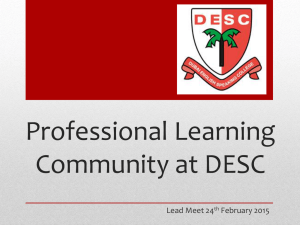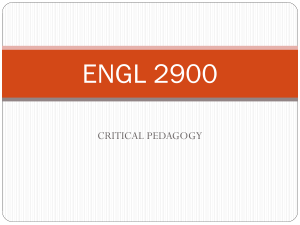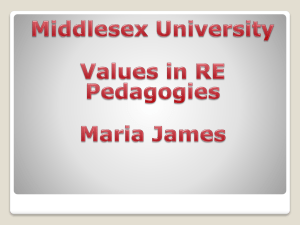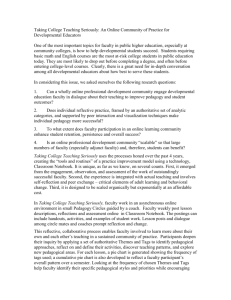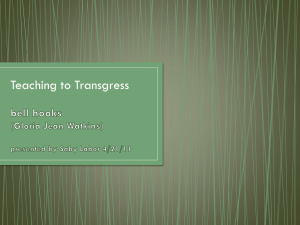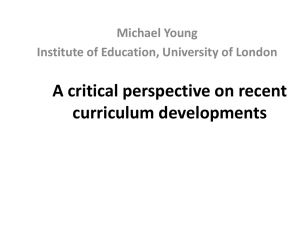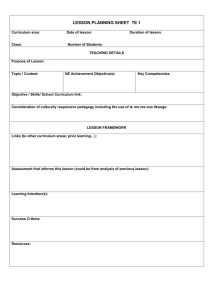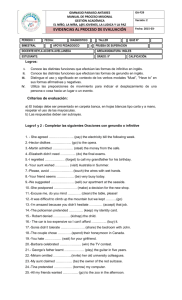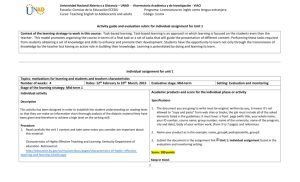Formato contenidos de cursos
advertisement
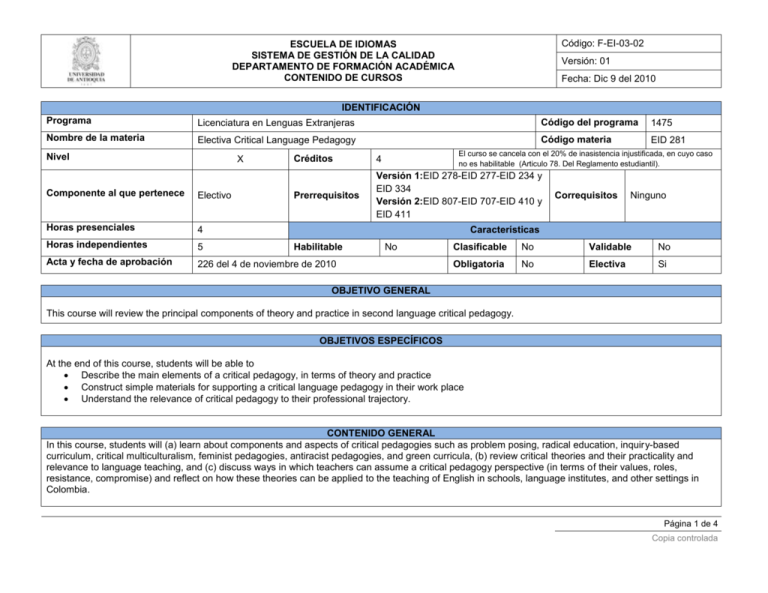
Código: F-EI-03-02 ESCUELA DE IDIOMAS SISTEMA DE GESTIÓN DE LA CALIDAD DEPARTAMENTO DE FORMACIÓN ACADÉMICA CONTENIDO DE CURSOS Versión: 01 Fecha: Dic 9 del 2010 IDENTIFICACIÓN Programa Licenciatura en Lenguas Extranjeras Código del programa 1475 Nombre de la materia Electiva Critical Language Pedagogy Código materia EID 281 Nivel X El curso se cancela con el 20% de inasistencia injustificada, en cuyo caso no es habilitable (Articulo 78. Del Reglamento estudiantil). Créditos 4 Prerrequisitos Versión 1:EID 278-EID 277-EID 234 y EID 334 Versión 2:EID 807-EID 707-EID 410 y EID 411 Componente al que pertenece Electivo Horas presenciales 4 Horas independientes 5 Acta y fecha de aprobación 226 del 4 de noviembre de 2010 Correquisitos Ninguno Características Habilitable No Clasificable No Validable No Obligatoria No Electiva Si OBJETIVO GENERAL This course will review the principal components of theory and practice in second language critical pedagogy. OBJETIVOS ESPECÍFICOS At the end of this course, students will be able to Describe the main elements of a critical pedagogy, in terms of theory and practice Construct simple materials for supporting a critical language pedagogy in their work place Understand the relevance of critical pedagogy to their professional trajectory. CONTENIDO GENERAL In this course, students will (a) learn about components and aspects of critical pedagogies such as problem posing, radical education, inquiry-based curriculum, critical multiculturalism, feminist pedagogies, antiracist pedagogies, and green curricula, (b) review critical theories and their practicality and relevance to language teaching, and (c) discuss ways in which teachers can assume a critical pedagogy perspective (in terms of their values, roles, resistance, compromise) and reflect on how these theories can be applied to the teaching of English in schools, language institutes, and other settings in Colombia. Página 1 de 4 Copia controlada ESCUELA DE IDIOMAS SISTEMA DE GESTIÓN DE LA CALIDAD DEPARTAMENTO DE FORMACIÓN ACADÉMICA CONTENIDO DE CURSOS Código: F-EI-03-02 Versión: 01 Fecha: Dic 9 del 2010 METODOLOGÍA The course will operate using a mixture of lecture, teacher-led discussion, student-led discussion of readings, and some practical hands-on work in class. In class, we will address the connection between critical pedagogy core concepts and underlying principles, students’ personal experiences, ideas, and beliefs, and their teaching practice. ACTIVIDADES EVALUACIÓN Assessment (1) Students will plan and lead class discussions of assigned readings. 25% (2) Students will choose a setting (most likely where they are currently teaching) and then complete a lesson plan for initiating syllabus negotiation in that setting and 25% a sample module of lesson plans and materials that they can use in that setting, 30% (3) Students will complete a short piece of personal reflective writing about the theoretical content of the course and the writer’s personal values (2500 words) 20% BIBLIOGRAFÍA Y CIBERGRAFÍA SUGERIDAS (Regirse por las normas APA) Auerbach, E., & Wallerstein, N. (1987). ESL in action. New York: Prentice-Hall Breen, M., & Littlejohn, A. (2001). The negotiated syllabus. Cambridge University Press. Cowhey, M. (2006). Black ants and buddhists. Stenhouse. Página 2 de 4 Copia controlada ESCUELA DE IDIOMAS SISTEMA DE GESTIÓN DE LA CALIDAD DEPARTAMENTO DE FORMACIÓN ACADÉMICA CONTENIDO DE CURSOS Código: F-EI-03-02 Versión: 01 Fecha: Dic 9 del 2010 Crookes, G. (2009). Values, philosophies, and beliefs in TESOL. Cambridge University Press. Crookes, G. (2010). [extract from] The practicality and relevance of second language critical pedagogy. Language Teaching, 42(4). Crookes, G, & Talmy, S. (2004). Second/Foreign Language program preservation and advancement: Literatures and lessons for teachers and teacher education. Critical Inquiry in Language Studies, 1(4), 219-236. Curtis, A. & Romney, M. (Eds.). (2006). Color, race, and English language teaching: shades of meaning. Mahwah, NJ: Lawrence Erlbaum De los Reyes, E. (2002). Moving from the field of terror to the field of hope: Project 10 East, a Gay-Straight Alliance. In E. de los Reyes & P. Gozemba, Pockets of hope. Westport, CT: Bergin & Garvey. Freire, P. [1969]/1973 Education for critical consciousness. New York: Seabury Press. Konoeda, K., & Watanabe, Y. (2008). Task-based critical pedagogy in Japanese EFL classrooms. In M. Montero, P. C. Miller, & J. L. Watzke (eds.), Readings in language studies (vol. 1; pp. 45-61). St. Louis, MO: International Society for Language Studies. Nelson, C. (1999). Sexual identities in TESOL. TESOL Quarterly, 33,371–391. Rogers, R. (2004) ch. 1 An introduction to critical discourse analysis in education. In R. Rogers (Ed), An introduction to critical discourse analysis in education. Erlbaum. Shin, H., & Crookes, G. 2005b. Exploring the possibilities for EFL critical pedagogy in Korea – a two-part case study. Critical Inquiry in Language Studies, 2(2), 113-138. Shohamy, E. (2001). Democratic assessment as an alternative. Language Testing. 12, 371-392. Shor, I. (1980). Critical teaching and everyday life. Boston : South End Press Smoke, T. (1998). Critical multiculturalism as a means of promoting social activism and awareness. In T. Smoke (ed.), Adult ESL: Politics, pedagogy, and participation in classroom and community programs (pp. 89–98). Mahwah, NJ: Lawrence Erlbaum. Thorne, S. (2004). Cultural historical activity theory and the object of innovation. In K. van Essen & O. St. John (eds.), New insights into foreign language learning and teaching. Berlin: Peter Lang. Vandrick, S. (1994). Feminist pedagogy and ESL. College English 4(2), 69-92. Página 3 de 4 Copia controlada ESCUELA DE IDIOMAS SISTEMA DE GESTIÓN DE LA CALIDAD DEPARTAMENTO DE FORMACIÓN ACADÉMICA CONTENIDO DE CURSOS Código: F-EI-03-02 Versión: 01 Fecha: Dic 9 del 2010 Vandrick, S. (1998). Promoting gender equity in the postsecondary ESL class. In T. Smoke (Ed.), Adult ESL: Politics, pedagogy, and participation in classroom and community programs (pp. 73-88). Mahwah, NJ: Lawrence Erlbaum. Wallerstein, N. 1983. Language and culture in conflict: problem-posing in the ESL classroom. Addison Wesley. Wright, N. (1989). Assessing radical education: a critical review of the radical movement in english schooling, 1960-1980. Milton Keynes, UK: Open University Press. OBSERVACIONES Página 4 de 4 Copia controlada
